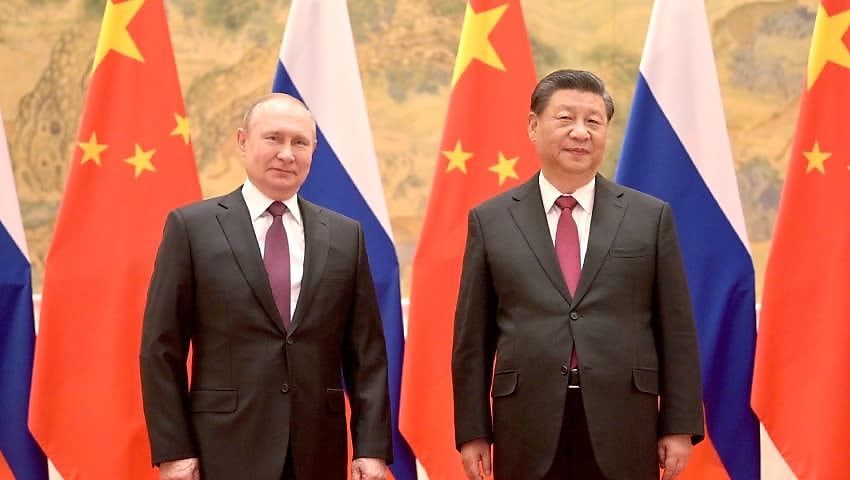Will Beijing continue to pursue closer ties with the Kremlin, or will the relationship give way to China’s broader ambitions?
To continue reading the rest of this article, please log in.
Create free account to get unlimited news articles and more!
In early February, Chinese President Xi Jinping hosted Russian President Vladimir Putin in Beijing as part of an effort to further strengthen bilateral relations.
The pair signed a “no limits” partnership, releasing a statement, which among other things, affirmed joint opposition to NATO expansion in eastern Europe.
Just weeks later, President Putin launched a full-scale invasion of Ukraine, prompting some observers to presume Chinese consent and support for the move.
The pair met again last month in Uzbekistan to discuss developments in Ukraine and in the Taiwan Strait.
The trip marked President Xi’s first overseas trip in over two years and came just months ahead of the Chinese Communist Party’s 20th National Congress.
But will this endure or are there indeed limits to this “no limits” partnership?
According to Min-Hua Chiang — research fellow and economist, Asian Studies Center at the Heritage Foundation — the crippling impact of Russia’s ongoing clash with Ukraine will likely dissuade Beijing from pursuing bolder ties with Moscow.
“Russia accounts for only a small proportion of Chinese trade (2 per cent in 2021),” she writes.
“Beijing’s trade ties with the US and Europe are much greater (26 per cent in 2021), according to Trade Data Monitor.
“Despite sharp differences with the West — over human-rights violations in Xinjiang and over the status of Taiwan, to name but two issues — China has proved unwilling to weaken economic ties with the West on Russia’s behalf.”
Chiang argues China’s leadership fears “creeping too far in bed with Putin”, risking Western financial sanctions on Beijing.
“China’s State Administration of Foreign Exchange reports that, as of July 2022, China holds $3.1 trillion of foreign-currency reserves, the largest such holding in the world. China is also the second-largest holder (after Japan) of US Treasury securities, at $968 billion,” she notes.
“Some analysts have argued that China’s significant weight in the global economy protects it from Western sanctions. Nevertheless, Chinese firms are unwilling to risk them, as signalled by their reaction to the war in Ukraine.”
Chiang points to the reluctance among Chinese banks to extend credit for trade with Russia.
“Chinese energy companies, such as Sinopec, have frozen projects with their Russian counterparts. China’s credit-card processor UnionPay refused to work with Russian banks after Visa and Mastercard stopped servicing them,” she adds.
“Even the blacklisted Chinese tech giant Huawei has scaled back its operations in Russia to avoid being sanctioned.”
Further, Chiang notes the impact of China’s “zero COVID” restrictions on the provision of long-term assistance to Russia.
“To date, China’s assistance to Moscow has been limited to increasing imports of Russian oil and gas and increasing the use of China’s currency in bilateral trade transactions,” she continues.
“Neither action is restricted by any international sanctions. However, those efforts have secured only limited benefits for China.”
Chiang acknowledges China has benefited from discounted Russian energy, but states Beijing would be wary of becoming too dependent on Moscow.
“Beijing does not want to become so reliant on Russian energy as to give Moscow unwanted political or economic leverage,” she writes.
“Similarly, given Russia’s role as but a minor trade partner, the greater use of renminbi in Russia–China trade transactions is likely to do little to advance the internationalisation of the Chinese currency.”
Chiang goes on to reflect on the United States’ capitalisation on the “Sino–Soviet split” to “court Beijing and advance its geopolitical interests”.
But according to Chiang, China would not employ the same strategy with Russia, given its reliance on access to Western finance, trade, and technology.
She concludes: “Knowing that Russia relies on a country whose regime survival is strongly linked to the US-led global economy, the US should continue developing tools — including trade sanctions and restrictions on technology transfer — to disincentivise Chinese economic support of Russia.”
Get involved with the discussion and let us know your thoughts on Australia’s future role and position in the Indo-Pacific region and what you would like to see from Australia's political leaders in terms of partisan and bipartisan agenda setting in the comments section below, or get in touch with

 Login
Login







